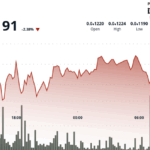Bipartisan Scramble: Senate Passes AI Research Funding Act Amid Ethical Concerns
After nearly five years of litigation, cryptocurrency firm Ripple and the US Securities and Exchange Commission (SEC) have filed a joint motion seeking to revise an existing court judgment, according to recent filings. However, persuading Judge Analisa Torres to alter her decision remains a significant hurdle.
The motion filed by both parties respectfully asks Judge Torres to address the injunction against Ripple and potentially reduce the proposed $125 million penalty to $50 million, citing “exceptional circumstances.” Ripple contends these unforeseen factors warrant a modification of the previous ruling.
Cryptocurrency attorney John Deaton, speaking during a recent broadcast on X, criticized the filing, stating it “left meat off the bone.” He suggested the motion did not sufficiently address key judicial concerns regarding its thoroughness.
Deaton warned that Judge Torres, having spent years crafting the original decision, would not be easily swayed to reverse her ruling. The attorney argued that the filing missed strategic opportunities to persuade Her Honor. Notably, Deaton pointed out the lack of emphasis on how previous SEC leadership under Gary Gensler pursued an overly aggressive and inconsistent enforcement strategy.
Subsequent leadership under current SEC Chair Paul Atkins has reportedly adjusted that approach. However, the filing from Ripple’s representatives largely overlooked this crucial context.
Further cause for concern among legal experts is the supposed justification for relief under the “exceptional circumstances” rationale. Deaton observed that the motion did not adequately argue why Ripple specifically merits the removal of an injunction—a colloquially termed “dark cloud”—while simultaneously allowing for regulatory clarity for other firms in the industry.
Torres’ original ruling acknowledged that XRP is a security only in the context of primary market sales to investors in an offering. This crucial distinction was invalidated by finding that Ripple’s institutional sales from inventory did nonetheless violate securities laws.
Speaking with Reuters, Deaton described Judge Torres as “applying the law.” He now anticipates her approach would necessitate compelling justification for a departure from the decision without summarily discarding it.
Assessing the likelihood of the motion’s acceptance, Deaton estimated a 70% probability of rejection. His analysis suggests Judge Torres may favor settlement through final judgment rather than embarking on another round of litigation.
Regardless of the current motion’s fate, Deaton remains skeptical about achieving relief through arguments related to “exceptional circumstances.” If the motion is denied, the case would revert to the US Court of Appeals for the Second Circuit. It is understood appeals remain pending on both sides against Torres’ original judgment pending the outcome of this revision request.












